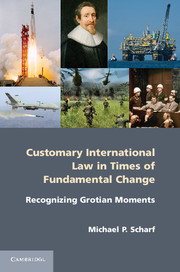Book contents
- Frontmatter
- Contents
- Author’s Biography
- Acknowledgments
- 1 Introduction
- 2 Historical Context
- 3 Theoretical Underpinnings
- 4 Nuremberg
- 5 The Truman Proclamation on the Continental Shelf
- 6 Outer Space Law
- 7 The Yugoslavia Tribunal’s Tadic Decision
- 8 The 1999 NATO Intervention
- 9 The Response to 9/11
- 10 Conclusion
- Index
- References
3 - Theoretical Underpinnings
Published online by Cambridge University Press: 05 June 2013
- Frontmatter
- Contents
- Author’s Biography
- Acknowledgments
- 1 Introduction
- 2 Historical Context
- 3 Theoretical Underpinnings
- 4 Nuremberg
- 5 The Truman Proclamation on the Continental Shelf
- 6 Outer Space Law
- 7 The Yugoslavia Tribunal’s Tadic Decision
- 8 The 1999 NATO Intervention
- 9 The Response to 9/11
- 10 Conclusion
- Index
- References
Summary
To provide theoretical infrastructure for the exploration of the Grotian Moment concept, this chapter examines the scholarly debate about the nature and formation of customary international law. Then, building on the literature examining rapid formation of customary international law, the chapter explores the role played by context and fundamental technological and tactical change as an accelerating agent.
The Importance of Customary International Law
To paraphrase Mark Twain, reports of the death of customary international law are greatly exaggerated. Despite its widespread codification in treaties during the last century, the unwritten norms, rules, and principles of customary law continue to play a crucial role in international relations. There are three primary reasons for customary international law’s continuing vitality.
First, in some ways, customary international law possesses more jurisprudential power than does treaty law. Unlike treaties, which bind only the parties thereto, once a norm is established as customary international law, it is binding on all states, even those new to a type of activity, so long as they did not persistently object during its formation. Since some international law rules coexist in treaties and custom, customary international law expands the reach of the rules to those states that have not yet ratii ed the treaty. In addition, the customary international law status of the rules can apply to actions of the treaty parties that predated the entry into force of the treaty. Moreover, states that were not even in existence at the time the norm evolved, such as colonies or former parts of a larger state, and therefore never had an opportunity to express their positions as a particular rule emerged, are nonetheless generally deemed to be bound by the entire corpus of customary international law existing upon the date they become sovereign states. Finally, unlike some treaties that by their terms permit withdrawal, customary international law does not recognize a unilateral right to withdraw from it.
- Type
- Chapter
- Information
- Customary International Law in Times of Fundamental ChangeRecognizing Grotian Moments, pp. 29 - 62Publisher: Cambridge University PressPrint publication year: 2013



